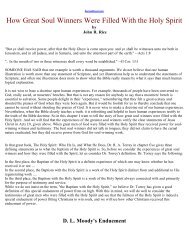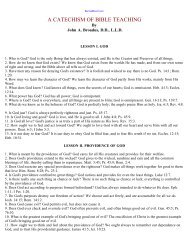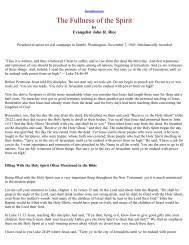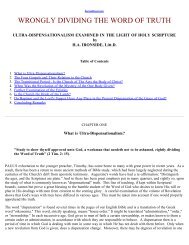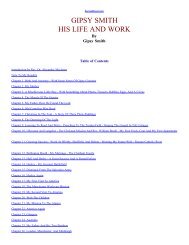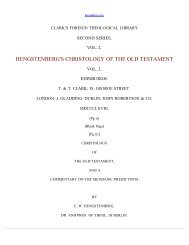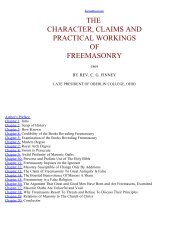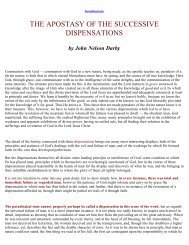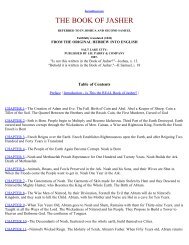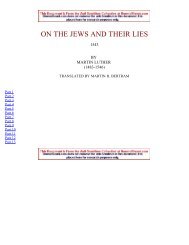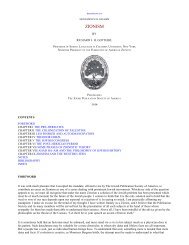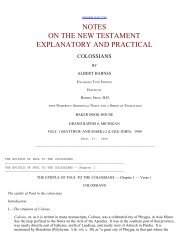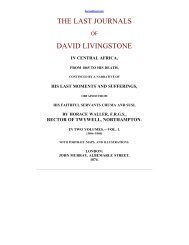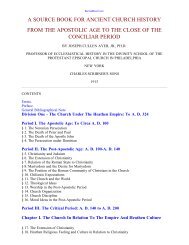Legends of Babylon and Egypt in Relation to Hebrew Tradition.pdf
Legends of Babylon and Egypt in Relation to Hebrew Tradition.pdf
Legends of Babylon and Egypt in Relation to Hebrew Tradition.pdf
Create successful ePaper yourself
Turn your PDF publications into a flip-book with our unique Google optimized e-Paper software.
local ra<strong>in</strong> must be sought for the sudden <strong>and</strong> overwhelm<strong>in</strong>g catastrophes <strong>of</strong> which the rivers are capable.<br />
[1] For detailed lists <strong>of</strong> the po<strong>in</strong>ts <strong>of</strong> agreement presented by the <strong>Hebrew</strong> Versions J <strong>and</strong> P <strong>to</strong> the account <strong>in</strong> the<br />
Gilgamesh Epic, see Sk<strong>in</strong>ner, op. cit., p. 177 f.; Driver, /Genesis/, p. 106 f.; <strong>and</strong> Gordon, /Early <strong>Tradition</strong>s <strong>of</strong> Genesis/<br />
(1907), pp. 38 ff.<br />
Thus, viewed from a purely literary st<strong>and</strong>po<strong>in</strong>t, we are now enabled <strong>to</strong> trace back <strong>to</strong> a primitive age the ancestry <strong>of</strong> the<br />
traditions, which, under a very different aspect, eventually found their way <strong>in</strong><strong>to</strong> <strong>Hebrew</strong> literature. And <strong>in</strong> the process<br />
we may note the changes they underwent as they passed from one race <strong>to</strong> another. The result <strong>of</strong> such literary analysis<br />
<strong>and</strong> comparison, so far from discredit<strong>in</strong>g the narratives <strong>in</strong> Genesis, throws <strong>in</strong><strong>to</strong> still stronger relief the moral gr<strong>and</strong>eur<br />
<strong>of</strong> the <strong>Hebrew</strong> text.<br />
We come then <strong>to</strong> the question, at what periods <strong>and</strong> by what process did the <strong>Hebrew</strong>s become acqua<strong>in</strong>ted with<br />
<strong>Babylon</strong>ian ideas? The tendency <strong>of</strong> the purely literary school <strong>of</strong> critics has been <strong>to</strong> expla<strong>in</strong> the process by the direct use<br />
<strong>of</strong> <strong>Babylon</strong>ian documents wholly with<strong>in</strong> exilic times. If the Creation <strong>and</strong> Deluge narratives s<strong>to</strong>od alone, a case might<br />
perhaps be made out for conf<strong>in</strong><strong>in</strong>g <strong>Babylon</strong>ian <strong>in</strong>fluence <strong>to</strong> this late period. It is true that dur<strong>in</strong>g the Captivity the Jews<br />
were directly exposed <strong>to</strong> such <strong>in</strong>fluence. They had the life <strong>and</strong> civilization <strong>of</strong> their cap<strong>to</strong>rs immediately before their<br />
eyes, <strong>and</strong> it would have been only natural for the more learned among the <strong>Hebrew</strong> scribes <strong>and</strong> priests <strong>to</strong> <strong>in</strong>terest<br />
themselves <strong>in</strong> the ancient literature <strong>of</strong> their new home. And any previous familiarity with the myths <strong>of</strong> <strong>Babylon</strong>ia<br />
would undoubtedly have been <strong>in</strong>creased by actual residence <strong>in</strong> the country. We may perhaps see a result <strong>of</strong> such<br />
acqua<strong>in</strong>tance with <strong>Babylon</strong>ian literature, after Jehoiach<strong>in</strong>'s deportation,, <strong>in</strong> an <strong>in</strong>terest<strong>in</strong>g literary parallel that has been<br />
po<strong>in</strong>ted out between Ezek. xiv. 12-20 <strong>and</strong> a speech <strong>in</strong> the <strong>Babylon</strong>ian account <strong>of</strong> the Deluge <strong>in</strong> the Gilgamesh Epic,<br />
XI, ll. 180- 194.[1] The passage <strong>in</strong> Ezekiel occurs with<strong>in</strong> chaps. i-xxiv, which correspond <strong>to</strong> the prophet's first period<br />
<strong>and</strong> consist <strong>in</strong> the ma<strong>in</strong> <strong>of</strong> his utterances <strong>in</strong> exile before the fall <strong>of</strong> Jerusalem. It forms, <strong>in</strong> fact, the <strong>in</strong>troduction <strong>to</strong> the<br />
prophet's announcement <strong>of</strong> the com<strong>in</strong>g <strong>of</strong> "four sore judgements upon Jerusalem", from which there "shall be left a<br />
remnant that shall be carried forth".[2] But <strong>in</strong> consequence, here <strong>and</strong> there, <strong>of</strong> traces <strong>of</strong> a later po<strong>in</strong>t <strong>of</strong> view, it is<br />
generally admitted that many <strong>of</strong> the chapters <strong>in</strong> this section may have been considerably amplified <strong>and</strong> altered by<br />
Ezekiel himself <strong>in</strong> the course <strong>of</strong> writ<strong>in</strong>g. And if we may regard the literary parallel that has been po<strong>in</strong>ted out as<br />
anyth<strong>in</strong>g more than fortui<strong>to</strong>us, it is open <strong>to</strong> us <strong>to</strong> assume that chap. xiv may have been worked up by Ezekiel many<br />
years after his prophetic call at Tel-abib.<br />
[1] See Daiches, "Ezekiel <strong>and</strong> the <strong>Babylon</strong>ian Account <strong>of</strong> the Deluge", <strong>in</strong> the /Jewish Quarterly Review/, April 1905. It<br />
has <strong>of</strong> course long been recognized that Ezekiel, <strong>in</strong> announc<strong>in</strong>g the punishment <strong>of</strong> the k<strong>in</strong>g <strong>of</strong> <strong>Egypt</strong> <strong>in</strong> xxxii. 2 ff., uses<br />
imagery which strongly recalls the <strong>Babylon</strong>ian Creation myth. For he compares Pharaoh <strong>to</strong> a sea-monster over whom<br />
Yahweh will throw his net (as Marduk had thrown his over Tiamat); cf. Loisy, /Les mythes babyloniens et les premiers<br />
chaptires de la Genèse/ (1901), p. 87.<br />
[2] Ezek. xiv. 21 f.<br />
In the passage <strong>of</strong> the <strong>Babylon</strong>ian Epic, Enlil had already sent the Flood <strong>and</strong> had destroyed the good with the wicked.<br />
Ea thereupon remonstrates with him, <strong>and</strong> he urges that <strong>in</strong> future the s<strong>in</strong>ner only should be made <strong>to</strong> suffer for his s<strong>in</strong>;<br />
<strong>and</strong>, <strong>in</strong>stead <strong>of</strong> aga<strong>in</strong> caus<strong>in</strong>g a flood, let there be discrim<strong>in</strong>ation <strong>in</strong> the div<strong>in</strong>e punishments sent on men or l<strong>and</strong>s. While<br />
the flood made the escape <strong>of</strong> the deserv<strong>in</strong>g impossible, other forms <strong>of</strong> punishment would affect the guilty only. In<br />
Ezekiel the subject is the same, but the po<strong>in</strong>t <strong>of</strong> view is different. The l<strong>and</strong> the prophet has <strong>in</strong> his m<strong>in</strong>d <strong>in</strong> verse 13 is<br />
evidently Judah, <strong>and</strong> his desire is <strong>to</strong> expla<strong>in</strong> why it will suffer although not all its <strong>in</strong>habitants deserved <strong>to</strong> share its fate.<br />
The discrim<strong>in</strong>ation, which Ea urges, Ezekiel asserts will be made; but the s<strong>in</strong>ner must bear his own s<strong>in</strong>, <strong>and</strong> the<br />
righteous, however em<strong>in</strong>ent, can only save themselves by their righteousness. The general pr<strong>in</strong>ciple propounded <strong>in</strong> the<br />
Epic is here applied <strong>to</strong> a special case. But the parallelism between the passages lies not only <strong>in</strong> the general pr<strong>in</strong>ciple<br />
but also <strong>in</strong> the literary sett<strong>in</strong>g. This will best be brought out by pr<strong>in</strong>t<strong>in</strong>g the passages <strong>in</strong> parallel columns.<br />
Gilg. Epic, XI, 180-194 Ezek. xiv. 12-20<br />
Ea opened his mouth <strong>and</strong> spake, And the word <strong>of</strong> the Lord came He said <strong>to</strong> the warrior Enlil; un<strong>to</strong> me, say<strong>in</strong>g, Thou<br />
direc<strong>to</strong>r <strong>of</strong> the gods! O Son <strong>of</strong> man, when a l<strong>and</strong> s<strong>in</strong>neth warrior! aga<strong>in</strong>st me by committ<strong>in</strong>g a Why didst thou not take<br />
counsel trespass, <strong>and</strong> I stretch out but didst cause a flood? m<strong>in</strong>e h<strong>and</strong> upon it, <strong>and</strong> break On the transgressor lay his the



